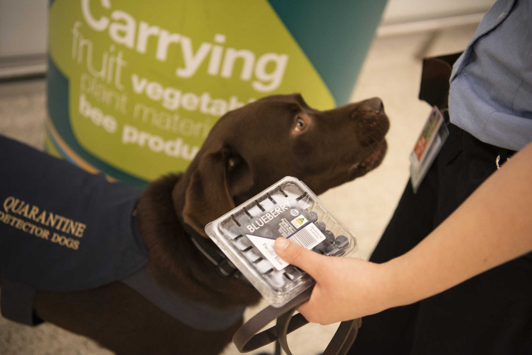Moving to WA and bringing personal effects
When moving personal effects into WA, you should always complete a Declaration for movement of personal goods into WA form in conjunction with your removals company. Ask your removals company to supply the freight container details and to lodge the form on your behalf. Importers and travellers can expect some delays as a result of these quarantine procedures and should also be aware that inspection fees and charges may be applied.
Download the form from the Import permit applications form section of the Biosecurity forms page.
Some plants, plant products and animals that pose a high risk of carrying diseases or becoming a pest or weed may not be allowed into the State.
Declaring quarantine risk material
In accordance with regulated entry conditions, quarantine risk material must be declared to a Quarantine Inspector on arrival into WA.
If in doubt about any item(s), declare them to a quarantine inspector, or deposit them in one of the bins available at the airport. Your baggage and hand luggage may be checked by inspectors with sniffer dogs for quarantine risk items as you collect it from the baggage carousel.
Quarantine inspectors located at various interstate borders will conduct checks for items considered a threat to WA. Road checkpoints on the WA/South Australia border (Eucla, Eyre Hwy) and WA/Northern Territory border (Kununurra, Victoria Hwy) operate 24 hours. Desert roads are subject to random mobile inspections. Quarantine bins are located 20 kilometres east of Laverton and on the Tanami Road and Duncan Highway near Halls Creek.
All interstate freight arriving by rail and sea is assessed and checked by quarantine inspection staff. Regular surveillance is carried out on the Indian Pacific train to ensure passengers are not carrying restricted items and vehicles are clean of soil and plant material.
Below is a summary for travellers of some common imports and their associated entry conditions. Quarantine entry requirements on these listed items can change depending on recent pest and disease outbreaks.
Common imports
Fruit and vegetables must be free of sprouting green growth, soil, pests and disease:
- pineapple
- watermelon (peeled and diced)
- onions (peeled)
- garlic (peeled)
- carrot
- corn on the cob (husk removed)
- mushrooms (commercially packaged)
- parsnip
- beetroot
- swede
- sweet potato
- pumpkin (peeled and seeds removed)
- taro
- turnip
- galangal
- turmeric
- ginger
- coconut (peri-carp removed, brown husk okay).
All fruit and vegetables are permitted if hard frozen on arrival except:
- grapes
- mango with seed
- unpeeled onions
- unpeeled garlic
- unpeeled potatoes
- fruit from the Myrtaceae family (includes guava, muntries, riberries etc).
Permitted if commercially packaged (no stems or parts of plants).
- Mangos must have seed removed.
- Dehydrated cooked meals are permitted.
Not permitted:
- Fruit from the Myrtaceae family (includes guava, muntries, riberries etc)
- Home-dried fruit is usually not acceptable unless the inspector is satisfied that the product is dried to the same standards as commercially dried fruit.
- All nuts are permitted except for raw walnuts in shell.
- Crustaceans (eg prawns, crayfish, lobster, crabs) must be cooked.
- Raw fresh or frozen crustaceans (including bait crustaceans e.g. bait prawns) are not permitted unless they meet specific import requirements. Phone Quarantine WA on (08) 9334 1800 for advice.
- Honey is prohibited unless certified on a Health Certificate.
- Bees, hive products and used equipment are prohibited except by permit.
Seeds that are permitted entry:
- lentils, pumpkin (pepita), sunflower, chia, hemp, poppy and flax seeds
- alfalfa sprouting seed (only in sprouting kits)
- popping corn must be commercially packaged
- split peas, lentils and soup mixes.
Sorghum seed is not permitted.
Must be unopened and labelled with the botanic name and of a permitted species.
Must be commercially packaged. Should contain no myrtle rust host material (including lemon myrtle).
- Processed wood and timber products without bark is permitted entry.
- Wood with bark – is not permitted unless the species name is known and not from the Myrtaceae family (e.g. includes eucalyptus).
- Firewood is permitted, but must be clean, free from bark and soil and unknown plant material.
- Subject to quarantine inspection for pests or the presence of seed. If pests or seed are found the product will be seized.
- Should contain no myrtle rust host material (including lemon myrtle and eucalyptus spp.). A good guide for identifying possible host is if there is a eucalyptus or tea tree-like smell. If the inspector has any doubt, the product will be seized for destruction.
- Microwave heat bags containing wheat, rice, lavender and similar are permitted entry.
Other materials to be aware of:
- Household garden equipment (eg. lawnmowers and catchers, whipper snippers, blower vacuums, mulchers) that can be presented for physical inspection at the border may be verified as free from all plant material and insects by an inspector.
- Flower/foliage arrangements may be seized and destroyed if not readily identifiable or if a pest or disease host.
- Truffles must be of a permitted species (check permitted status via the Western Australia Organism List).
You must also take care when bringing items such as shoes and boots that might have soil and dirt on them. Generally, all items that would normally be used outdoors should be examined to make sure they are free from soil and other contaminants. It is best to make sure they are thoroughly cleaned before entering WA.
When in doubt, we're here to help
Please contact the following depending on your enquiry.
-
Quarantine WA

